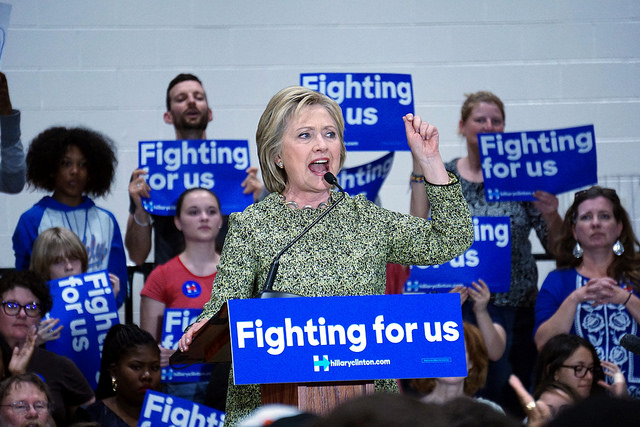
When democratic nominee Hillary Clinton left a 9/11 ceremony early because she wasn’t feeling well, her health and ability to fill the shoes of Commander in Chief were put in the spotlight. Hours after a video was released showing her struggling to make it to her vehicle, her campaign announced that she had been diagnosed with pneumonia just two days prior.
Her detractors heralded her diagnosis as confirmation of her being physically unfit for office, leading to blatant exaggerations from conservative news outlets. Speakers on Fox News suggested that her pneumonia would very likely lead to a traumatic brain injury, that she was coughing up blood, suffered from arthritis or possibly a stroke and even that she was dying — just to name a few.
Attacking Hillary’s health to such an extent on account of a cold is either one of two things: either simply the result of a heated, divisive election, or underlying sexism that refuses to see a woman as anything but weaker than her male counterparts.
I’m inclined to believe it the latter, considering the cryptic state of Donald Trump’s medical history and lack of criticism of his health in comparison. In light of Hillary’s pneumonia, Trump made it a point to hand two pages of medical history — which is hardly a comprehensive account— over to Dr. Oz while a guest on Oz’s show. The papers were signed by Jacob Bornstein, M.D., who claimed that Trump’s health was “astonishingly excellent” to the point of him being “the healthiest individual [who could] ever be elected to the presidency.”
Despite the fact that Trump’s records dealt exclusively in unlikely superlatives, Hillary Clinton seems to be the sole target of the media. Younger than Trump, who would be the oldest person ever elected to the presidency, Hillary Clinton is not the first presidential candidate to catch pneumonia. In fact, many of her male predecessors dealt with far worse illnesses while in office. Taft was morbidly obese with heart problems; Woodrow Wilson suffered from hypertension and strokes that left him disabled; FDR suffered from atherosclerosis, coronary artery disease, congestive heart failure and eventually died in office from a cerebral hemorrhage. Others include John F. Kennedy, who had Addison’s disease; Ronald Reagan, who had numerous diseases including prostate and skin cancer as well as Alzheimer’s in his later years; and George H. W. Bush, who suffered from ulcers, arthritis, atrial fibrillation, hypothyroidism and Grave’s disease.
The list of presidents and their life-threatening diseases goes on and on, and yet many of these men were able to hide their diseases from the media. However, Hillary Clinton transparently reveals that she has pneumonia and suddenly people are speculating that she would die in office, as if sneezing and a fever were reason to slap illnesses onto headlines. These same news stations that claim Clinton could die even disagree on whether or not the weather had been hot or humid enough for her to be at risk of fainting, as if exact temperature was subjective enough to argue about in the first place.
This kind of equivocating is part of a larger problem, and I think President Obama said it best: “There’s a reason why we haven’t had a woman president — that we as a society still grapple with what it means to see powerful women. And it still troubles us in a lot of ways, unfairly, and that expresses itself in all sorts of ways.”
Hillary Clinton is a powerful woman, whether you believe in her politics or not, and yet rather than talking about her politics, we are talking about her health while that of her opponent gets ignored — because despite her political prestige, she is perceived as weaker because she is a woman.
Even the way she talks has been under attack, as people such as Trump, Bob Woodward, Joe Scarborough, and others have repeatedly criticized her for not conducting herself in a manner that inspires likeability: she “yells” and has a “shrill voice.” Yet both Trump and Bernie have yelled consistently throughout their campaigns and received little to no criticism for it.
Because she is a woman, Hillary Clinton is criticized for her voice, her speech, her dress and her “weakness.” In an interview with Radio Europe 1 and TF1 TV before his visit to France, Vladimir Putin remarked that Hillary was weak, and that her aggressive criticisms of his actions in Crimea derived from this weakness, saying, “but maybe weakness is not the worst quality for a woman.” This kind of attitude is not reserved for racist and misogynistic figureheads like Trump and the Russian president. Hillary Clinton has faced this kind of sexism throughout her career in politics, and she continues to face it as she pursues the presidency.
Hillary Clinton’s pneumonia is not a death sentence. Having an illness only makes her human, not weak, and certainly not weak because she is a woman. The truth is that America should be less afraid of Hillary dying in office, and much more afraid of the kind of hate and fear-mongering that would occur if Trump became president. I genuinely believe that if Hillary Clinton were elected and died in office by some unlikely tragedy, she could act as Commander in Chief via Ouija board and still make a better president than Donald Trump.
